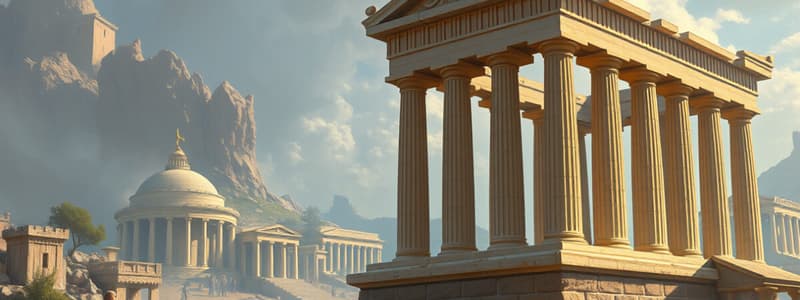Podcast
Questions and Answers
What was the period called when Athens entered its Golden Age under Pericles?
What was the period called when Athens entered its Golden Age under Pericles?
Golden Age
Who was the leader of Athens from about 460 to 429 B.C.E.?
Who was the leader of Athens from about 460 to 429 B.C.E.?
- Thucydides
- Pericles (correct)
- Socrates
- Plato
Most homes in Athens were two stories high and made of stone.
Most homes in Athens were two stories high and made of stone.
False (B)
What goddess was Athens named after?
What goddess was Athens named after?
What was the purpose of Greek temples?
What was the purpose of Greek temples?
The simplest Greek column is called the ______ column.
The simplest Greek column is called the ______ column.
What did Greek sculptors use to make a life-size model before creating a statue?
What did Greek sculptors use to make a life-size model before creating a statue?
What was the Theater of Dionysus known for?
What was the Theater of Dionysus known for?
Socrates was known for encouraging certainty in one's beliefs.
Socrates was known for encouraging certainty in one's beliefs.
What does the term 'philosophy' mean?
What does the term 'philosophy' mean?
Flashcards
What was Athens known for during its Golden Age?
What was Athens known for during its Golden Age?
Athens thrived after the Persian wars, becoming the cultural and artistic hub of Greece. It witnessed remarkable development in architecture, art, drama, and philosophy.
Who led Athens through its Golden Age?
Who led Athens through its Golden Age?
Pericles, a prominent leader, guided Athens's recovery after the Persian Wars. He oversaw the reconstruction of the city and commissioned iconic structures like the Parthenon.
What is the most famous structure built during the Golden Age of Athens?
What is the most famous structure built during the Golden Age of Athens?
The Parthenon, a majestic temple dedicated to the goddess Athena, is positioned on the Acropolis in Athens. It embodies the pinnacle of classical Greek architecture, showcasing their skilled craftsmanship and artistic vision.
What notable artistic skill characterized Greek sculptures?
What notable artistic skill characterized Greek sculptures?
Signup and view all the flashcards
Which god or goddess was associated with Athens?
Which god or goddess was associated with Athens?
Signup and view all the flashcards
How did drama develop in Greek culture?
How did drama develop in Greek culture?
Signup and view all the flashcards
Who was a influential philosopher of the Golden Age?
Who was a influential philosopher of the Golden Age?
Signup and view all the flashcards
Where did the Greeks hold their dramatic performances?
Where did the Greeks hold their dramatic performances?
Signup and view all the flashcards
What were Greek temples like?
What were Greek temples like?
Signup and view all the flashcards
How did the Greeks view sports in society?
How did the Greeks view sports in society?
Signup and view all the flashcards
Study Notes
Introduction to the Golden Age of Athens
- Following the Persian Wars, Athens was in ruins but was revitalized by leader Pericles.
- The Golden Age lasted from 479 to 431 B.C.E., marked by peace and prosperity.
- This period established Athens as the cultural and artistic center of Greece.
Athens After the Persian Wars
- The Persian Wars, though won by the Greeks, devastated Athens.
- Pericles led Athens from 460 to 429 B.C.E., overseeing the city’s reconstruction.
- Key contributions included the construction of public buildings such as the Parthenon.
A City of Contrasts
- Most Athenian homes were single-story, mud-brick structures; poorer homes were simplistic.
- Wealthier families lived in larger houses built around central courtyards.
- Athenian public spaces boasted grand stone buildings, notably around the agora.
Greek Religion
- Each city-state honored a specific god or goddess for protection; Athens was named for Athena.
- Gods and goddesses were believed to influence various aspects of life.
- A colossal statue of Athena, representing war and wisdom, was housed inside the Parthenon.
Greek Architecture
- Greek temples, designed for the gods, emphasize beauty and order rather than worship.
- Temples featured rows of tall columns and were constructed in three styles: Doric, Ionic, and Corinthian.
- The Parthenon on the acropolis is a prime example, showcasing classical architectural ideals.
Greek Sculpture
- The statue of Athena in the Parthenon exemplifies Greek sculptural skill.
- Sculpture workshops often operated near the intended display sites for statues.
- Sculptors used colored details and metal elements to bring statues to life, creating lifelike representations.
Greek Drama
- Drama was a major aspect of Athenian culture, with the Theatre of Dionysus accommodating thousands.
- Greek plays evolved from harvest songs and dances in honor of Dionysus, the merriment god.
- Playwrights wrote stories featuring main characters and a chorus commenting on the narrative.
Greek Philosophy
- Philosophical discussions in Athens revolved around nature, existence, and abstract concepts like justice and truth.
- Socrates, a notable philosopher, encouraged critical thinking by questioning conventional beliefs.
- His teachings led students to explore fundamental life inquiries, though he ultimately died from ingesting hemlock poison.
Greek Sports
- The Greek emphasis on sports reflected their appreciation for physical fitness as well as intellectual pursuits.
Studying That Suits You
Use AI to generate personalized quizzes and flashcards to suit your learning preferences.





